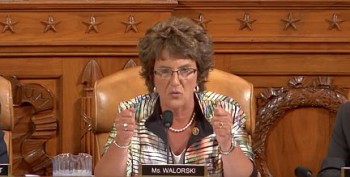 WASHINGTON – U.S. Rep. Jackie Walorski (R-Ind.) Wednesday questioned Medicare’s top fraud prevention official about how safeguards failed to prevent a doctor in Indiana from prescribing more than $1 million in opioids to 108 patients under Medicare’s prescription drug program.
WASHINGTON – U.S. Rep. Jackie Walorski (R-Ind.) Wednesday questioned Medicare’s top fraud prevention official about how safeguards failed to prevent a doctor in Indiana from prescribing more than $1 million in opioids to 108 patients under Medicare’s prescription drug program.
At a hearing of the House Ways and Means Oversight Subcommittee, Walorski asked Johnathan Morse, Acting Director of the Center for Program Integrity in the Centers for Medicare and Medicaid Services (CMS), about a recent Department of Health and Human Services (HHS) Office of Inspector General report on questionable prescribing patterns under Medicare Part D that cited an Indiana prescriber who in 2016 “wrote an average of 24 opioid prescriptions each for 108 beneficiaries who received extreme amounts,” at a cost to taxpayers of $1.1 million.
“What processes does CMS have in place to flag and investigate suspicious prescribing practices like this, and what do you think needs to be done to improve the system?” Congresswoman Walorski asked. “Obviously the filters that you’re talking about didn’t catch this. … As a result of these egregious violations, what new things are going into play now?”
“Well, we’re actually very pleased that the CARA [Comprehensive Addiction and Recovery Act] legislation from about a year ago was passed, and CMS is working to implement the Medicare lock-in program,” Acting Director Morse said. “Lock-in is something that’s been used very effectively by both state Medicaid programs, as well as by private payers, to be able to lock in a single beneficiary and a single prescriber. So essentially it helps monitor that overutilization and it helps sort of prevent that abuse from happening.”
The HHS Inspector General report also found “one in three Medicare Part D beneficiaries received a prescription opioid” last year, including 500,000 beneficiaries who received large amounts.
Video of Walorski questioning Morse at the hearing is available here. The text of their exchange is below.
REP. WALORSKI: Thank you, Mr. Chairman. Mr. Morse, according to this report, and many of us are talking about reports today, this is the HHS report, Office of Inspector General, on Medicare Part D, and it’s on this issue of opioids that you touched on just at the end of your testimony, and I appreciate that.
What I think is interesting about this and draws a red flag for me is one of the things they talk about here is a prescriber in my home state of Indiana wrote an average of 24 opioid prescriptions each for 108 beneficiaries in a year, costing Medicare Part D $1.1 million just to that Indiana physician. And I guess, I am not a health person, professional, it draws a red flag to me.
And I guess my question is, and I know you were probably getting to this on your statement, but what processes does CMS have in place to flag and investigate these suspicious prescribing practices like this, and what do you think needs to be done to improve the system, because I’m guessing that you’re going to say that, here’s what we do, and you’re going to say, yeah we need to do more, so my question is, what is the more, and whatever the filters are, to have gone through, one doctor in my state to be able to produce these kinds of records, I think is astounding. So just from your professional opinion, where do we go on this, what else has to happen, and then what do we do as Congress to help you get those filters?
MR. MORSE: Thank you. And we’ve reviewed that opioid report from the Inspector General’s office also, and it is quite concerning. We’ve got a number of efforts underway, in Medicare, both fee-for-service and in Medicare Part D, that try to address opioid prescribing abuses, as well as it’s obviously been a major focal point of this administration, of the secretary, of the past administration. CMS already has an opioid strategy that it published in January of 2017 on this very issue, and looking at sort of all the various levers that an agency as a payer can potentially be sort of pulling to help to address the opioid epidemic.
From the program integrity side, we have a number of things that we look at. We work with the Medicare program on the Overutilization Monitoring System that looks at it largely from the beneficiary perspective but looks at, does the beneficiary potentially have too many prescriptions, are there too many potentially in this case opioid prescriptions being prescribed in overlapping ways and how do we kind of make sure that is not –
REP. WALORSKI: Right, but obviously the filters that you’re talking about didn’t catch this. And so, from your perspective, if you had the magic wand and you could say, look, I’m over this, I studied this, I’m the professional, here’s exactly what we need to do, let’s at least try this, what would it be? Because the other thing disturbing about this, there’s a half a million beneficiaries receiving high amounts of opioids. So the filters aren’t working, so whatever was done prior to January of 2017 is not working, so we take that off the chart here, and we say that you say what is it that we’re not seeing here, and what can you in Congress do to help you get there?
MR. MORSE: We also have abusive prescribing authorities within Program Integrity at CMS.
REP. WALORSKI: Do you use them often?
MR. MORSE: We have used them only a handful of times at this point, because part of it is we need to be able to establish sort of that pattern and the practice, and when we see a pattern and practice it often is then referred to law enforcement.
REP. WALORSKI: How long is a pattern and a practice? So my Hoosier doc here that took this to the limit and over the top, so he’s writing an average of 24 prescriptions each for 108 people in a year, and it wasn’t flagged.
MR. MORSE: But when we do see something like that in our data, we flag it for law enforcement, so that’s how those cases begin, though. So in that case, there may have been data from CMS, in this particular case, there may have been data from CMS that we then flag for our law enforcement partners who then begin those investigations. So when the behavior is that egregious, if it’s something that we can see in our data, it is something that we need to be able to send to the inspector general’s office, to the state law enforcement, to DOJ, and then they begin sort of the more serious criminal and civil processes.
REP. WALORSKI: So what happens now as a result of this report? Because still what you’re describing is what’s happening pre-2017. As a result of these egregious violations, what new things are going into play now?
MR. MORSE: Well we’re actually very pleased that the CARA legislation from about a year ago was passed, and CMS is working to implement the Medicare lock-in program. So lock-in is something that’s been used very effectively by both state Medicaid programs as well as by private payers to be able to lock in a single beneficiary and a single prescriber. So essentially it helps monitor that overutilization and it helps sort of prevent that abuse from happening.
REP. WALORSKI: I appreciate it. Thank you, Mr. Chairman.
Walorski represents the 2nd Congressional District of Indiana, serving as a member of the House Ways and Means Committee.














